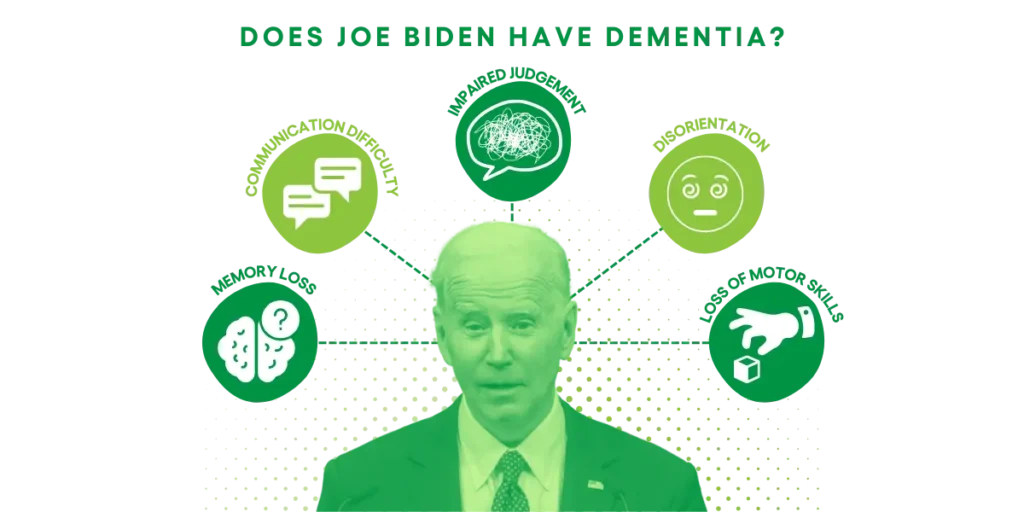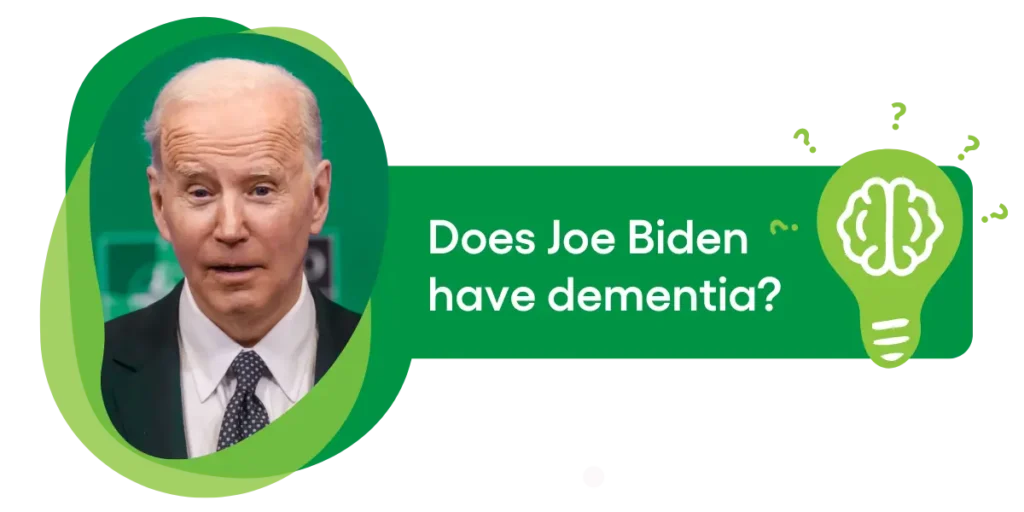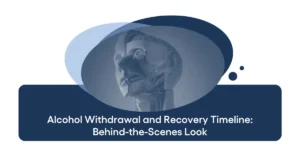Does Joe Biden have dementia? No. At this time, there is no clinical diagnosis to support claims of the president having dementia.
Special Counsel Robert Hur described President Joe Biden as an “elderly man with a poor memory” in a February 2024 press release.
Joe Biden, the 46th President of the United States, was born on November 20, 1942, in Pennsylvania. He entered politics in the 1970s and was Vice President under Barack Obama. He is currently in his first presidential term, and despite his age, he is expected to be deemed fit to run for a second term.
There are many questions about the president’s mental stability; the main one, “Does Joe Biden have dementia?” seems to be getting a lot of traffic online.
During a February 2024 investigation, Special Counsel Robert Hur described the President as an “elderly man with a poor memory.”

What is Dementia?
Dementia is a broad term used to describe a decline in cognitive function severe enough to interfere with daily life.
It is not a specific disease but rather a collection of symptoms associated with a decline in memory, thinking, reasoning, and other mental abilities. Dementia is typically caused by damage to brain cells, which can occur due to various diseases and conditions.
The most common type of dementia is Alzheimer’s disease, which accounts for 60-80% of cases. Other types of dementia include vascular dementia, Lewy body dementia, frontotemporal dementia, and mixed dementia (where more than one type of dementia is present).
Symptoms of Dementia
Dementia is progressive, meaning symptoms worsen over time. While there is currently no cure for most types of dementia, treatments and interventions can help manage symptoms, improve quality of life, and slow the progression of the disease in some cases.
It’s important to note that experiencing occasional forgetfulness or memory lapses does not necessarily mean a person has dementia. However, if these symptoms become more frequent or severe and begin to interfere with daily life, symptoms of dementia may include:
- Memory Loss: One of the most common early symptoms of dementia is memory loss, particularly difficulty remembering recent events or important information.
- Difficulty with Communication: People with dementia may have trouble finding the right words, understanding conversations, or following along with discussions.
- Impaired Judgment and Reasoning: Dementia can affect a person’s judgment and decision-making abilities, leading to poor choices or difficulty solving problems.
- Disorientation: Individuals with dementia may become disoriented and confused about time, place, or familiar surroundings.
- Difficulty with Tasks: Tasks that were once familiar and routine may become challenging for people with dementia. This can include everyday activities like cooking, dressing, or managing finances.
- Changes in Mood and Behavior: Dementia can cause changes in mood, personality, and behavior. This may manifest as increased agitation, irritability, anxiety, depression, or social withdrawal.
- Loss of Initiative: People with dementia may lose interest in activities they once enjoyed and may have difficulty initiating new activities or conversations.
- Difficulty with Motor Skills: In some cases, dementia can affect motor skills and coordination, leading to problems with balance, walking, or performing tasks that require fine motor control.
Diagnosing Dementia
Diagnosing dementia typically involves a comprehensive assessment by a healthcare professional, such as a doctor specializing in neurology or geriatric medicine.
The diagnostic process may include several steps:
- Medical History and Physical Examination: The healthcare provider will review the individual’s medical history, including symptoms, past medical conditions, medications, and family history. A thorough physical examination may also be conducted to assess overall health and neurological function.
- Cognitive and Mental Status Evaluation: The doctor may administer standardized tests to assess cognitive function, memory, language skills, attention, and problem-solving abilities. These tests can help detect cognitive impairment and track changes over time.
- Laboratory Tests: Blood tests may be ordered to rule out other medical conditions that could be causing or contributing to cognitive symptoms, such as thyroid disorders, vitamin deficiencies, or infections.
- Neuroimaging: Imaging tests such as MRI (magnetic resonance imaging) or CT (computed tomography) scans may be used to examine the brain and rule out other potential causes of cognitive decline, such as tumors, strokes, or structural abnormalities.
- Neuropsychological Testing: In some cases, more detailed neuropsychological assessments may be conducted to evaluate specific cognitive functions and identify patterns of impairment.
- Diagnostic Criteria: Diagnosis of dementia is often based on established diagnostic criteria, such as those outlined in the Diagnostic and Statistical Manual of Mental Disorders (DSM-5) or the International Classification of Diseases (ICD-10). These criteria help healthcare professionals classify the type and severity of dementia based on the pattern of symptoms and other diagnostic findings.
- Follow-up and Monitoring: In some cases, additional evaluations may be necessary to monitor cognitive function over time and assess the progression of dementia. Regular follow-up appointments with healthcare providers are essential for ongoing management and support.
Claims have been made that President Biden has denied cognitive testing during routine physical examinations. These claims, however, have not been substantiated.

Dementia Traits Exhibited by Joe Biden
There has been plenty of speculation by the nation, the press, and social media that President Joe Biden has dementia – or a closely related memory disorder. The focus of these claims has been the President’s stuttering, date mix-ups, calling people by the wrong titles, stumbling, and more.
Some of the examples circling the media that support claims of dementia are:
- The President’s discussion of the Israel-Hamas War when he referred to Egypt’s leader Abdel Fattah El-Sissi as “the president of Mexico.”
- Speeches where President Biden said he claimed to talk to European leaders – France’s Francois Mitterrand and Germany’s Helmut Kohl – who had not held office since the 1990s and had died several years ago.
- His inability to recall significant milestones in his life, including the death of his son Beau Biden in 2015.
White House Press Secretary Karine Jean-Pierre has made several statements about the President’s gaffes – saying that slip-ups are common for most public figures. She has pointed out on several occasions that she has made slip-ups while reporting, as have other political figures, like House Speaker Mike Johnson, R-La.
Bottom Line: Does Joe Biden Have Dementia?
There is plenty of speculation online and in the media about the status of President Joe Biden’s mental cognition.
At this time, there is no clinical diagnosis to support claims of the President having dementia.
– so we cannot say that he does (or does not) have it.
A dementia diagnosis requires a comprehensive medical assessment completed by a trained healthcare professional. Once a diagnosis is made, the next step is managing the disorder with a personalized treatment program. If you believe that you or a loved one may have dementia, reach out to a healthcare provider to discuss your symptoms and possible treatment options.










